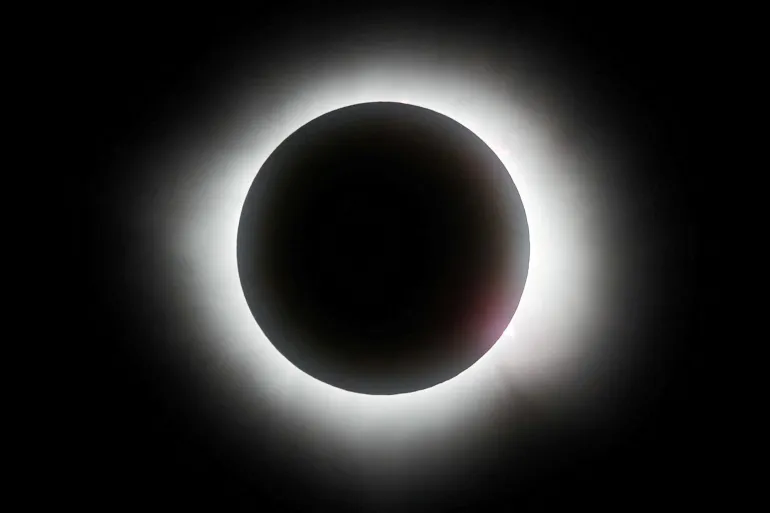Courtesy of Grambling State University
Mother Nature wasn’t fully cooperative, but that did not stop Grambling State University (GSU) students, faculty, and staff members from getting a glimpse of history Monday afternoon.
A watch party was held in the Quad in front of “Eddie the Tiger” with a solid crowd hoping to get at least a quick view of the only total solar eclipse to occur in the contiguous U.S. until August 2044 in Montana and North Dakota, with the next coast-to-coast total eclipse in the U.S. slated for 2045.
Dr. Stacey Duhon, Dean of the College of Arts and Sciences said there were two presentations made at GSU over the past week preparing for the eclipse, with Shane Pendleton of the National Weather Service in Shreveport visiting the university last week to provide a little knowledge behind the mechanics involved in an eclipse as well as myths and legends surrounding the solar events.
Dr. Tyler Fricker, Endowed Professor of Geoscience at the University of Louisiana Monroe, also gave a presentation on eclipse viewing for Grambling State students late Monday morning and stayed to watch the event in the GSU Quad.
“At one point there was a yell from the crowd when the students first saw it,” Dr. Duhon said. “So, I think it went really well because the students understood what they were looking for. As I walked through the group, the students were talking about what they were expecting to see and what Dr. Fricker talked about today when he said to look for the corona. You could only see the corona if you had (special viewing glasses) on.
“You could see it a little because of all the clouds, but you had to have your glasses on to see the corona. We wanted the students to know they just weren’t looking for the moon covering the sun. We wanted them to look for the finer details that made it even more special to the students because they understood what they were looking at. And when those clouds broke for a moment, that’s when you could hear the excitement.”
Jada Blount, a senior majoring in biology, said the viewing ended up being better than she first thought it would be as she arrived in GSU’s Quad.
“We saw it cover the sun and then come back like it was going back and forth,” Blunt said. “The glasses made it very bright and orange. I thought it was fascinating because without the glasses it looked just bright and the eclipse didn’t stand out.”
Trinidee Sanders, a senior majoring in criminal justice, agreed that it was wearing the special viewing glasses that made the experience more enjoyable.
“There were a lot of clouds, but with the glasses, I could see more than I expected,” Sanders said. “It was brighter than I expected, and a pretty cool experience here for our school watching it out here like this.”
GSU Professor of Curriculum and Instruction Dr. Kathryn Newman was watching for that brief moment while the clouds parted.
“A few of us were able to see it for 30-40 seconds when (the sun) was covered in about 40/% totality,” Dr. Newman said. “It didn’t last long because of the moving clouds, but people got really excited there for a half minute or so. That was fun to see.
“There were a lot of people with the viewing glasses on so that even when the clouds broke and they had a quick change at a quick view, they were able to take advantage even if the opportunity that really only lasted less than a minute.”
Mierra Simmons, a senior child development/early literacy major from Choudrant, Louisiana, marveled at the differences between Monday’s event and the 2017 eclipse she remembers viewing while in high school.
That 2017 eclipse traveled across the U.S. from the northern West Coach down through Georgia and South Carolina. Thursday’s event was first seen in North America in Mexico before traveling across the U.S. in a northeastward direction with a 115-mile-wide path of totality.
“I was especially impressed about the way it was going (the sun was moving), because it was making an ‘X’ from the one I watched a few miles east of here in 2017,” Simmons said. “I was in high school and remember watching it, but it went the other direction.

